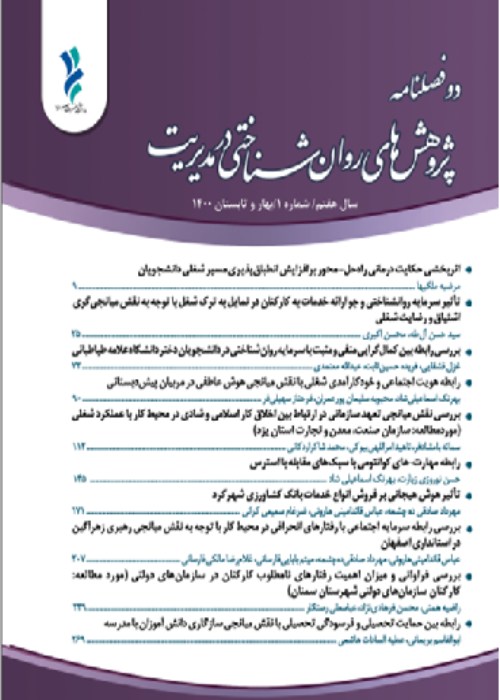The Mediating Role of Pro-Social Rule-Breaking and Leader-Member Exchange in the Impact of Ethical Leadership on Intention to Employee Turnover (Case study: Tehran Social Security Organization)
Intention to employee turnover of key employees in leading organizations has become one of the most important concerns of managers and leaders that by changing the type of leadership style and relationships between managers and employees can reduce the tendency to turnover employees. Ethical leaders try to encourage employees to do the right thing, have justice and deal appropriately with clients in any situation and condition by creating moral awareness, giving responsibility and delegating some responsibilities to subordinates by creating a collaborative atmosphere. Ethical leadership style leads to improvement and promotion of leader-member exchange. Ethical leadership is an influencing factor on pro-social rule-breaking. Pro-social rule-breaking, which is a constructive and positive law breaking, leads to the reduction of deviant behaviors in employees and makes them attached to their organization and leads to the reduction of the intention to turnover in employees. The purpose of this study is to investigate the effect of ethical leadership on employee turnover with emphasis on mediation pro-social rule-breaking and leader-member exchange.
Design/Methodology/Approach:
The research method is practical in terms of the type of objective. 3200 employees of Tehran Social Security Organization were selected as the population, based on random cluster sampling and using Cochran's formula, 342 people were selected as a statistical sample, and during this time, a questionnaire tool was used to collect data. In this regard, standard questionnaires were used, whose reliability and validity were confirmed during the research. In order to analyze the data, SPSS and AMOS software were used, and the data were analyzed using the structural equation modeling method.
The results showed that the ethical leadership style has a direct and significant effect on intention to employee turnover. Ethical leadership always considers the interests of employees and promotes friendship and justice among employees so that employees can trust their leaders. Employees' high trust in their leaders prevents them from leaving the service, so the rate of Turnover the organization decreases. Through the mediating variables of leader-member exchange and pro-social rule-breaking, it can indirectly have a significant effect on the intention to employee turnover. Ethical leaders, due to the promotion of ethical principles and fair treatment of employees, want employees to achieve their individual goals and achieve the goals of the beneficiaries, as a result, they grant the necessary power to the employees to be able to fulfill the individual goals and the beneficiaries of the cumbersome laws. Bypass Ethical leaders lead to the creation of friendly and intimate relationships with employees through fair behaviors, by creating value and moral awareness, giving authority and responsibility to people, adopting collaborative management, etc. In this way, leader-member exchange between managers and employees are strengthened and they can freely transfer information to each other and with full openness. Also, leader-member exchange can independently lead to pro-social rule-breaking in the organization.
The present research can bring many positive results and lead to the expansion of ethical leadership in organizations, which provides the basis for increasing communication between managers and employees, and also leads to achieving the organization's high goals and reducing intention to employee turnover. Social security organizations can encourage benevolent rule-breaking by promoting a culture of creativity and innovation, which can include giving employees more autonomy and flexibility in their work and encouraging them to think outside the box when dealing with social issues. Social security managers should try to establish an ethical leadership style in the organization and create a friendly and cooperative atmosphere in the organization so that employees can strive to achieve organizational goals and not be afraid of existing obstacles. Also, strengthening relationships is one of the requirements of any organization, especially the social security providers, so that the employees who attract and hire and hold training courses for them do not want to leave the place of service and can bring the organization closer to its real vision with increasing efforts. Social security organizations can promote ethical decision-making among employees by providing clear guidance on the organization's values and ethical principles and encouraging employees to consider the potential consequences of their actions.
- حق عضویت دریافتی صرف حمایت از نشریات عضو و نگهداری، تکمیل و توسعه مگیران میشود.
- پرداخت حق اشتراک و دانلود مقالات اجازه بازنشر آن در سایر رسانههای چاپی و دیجیتال را به کاربر نمیدهد.



